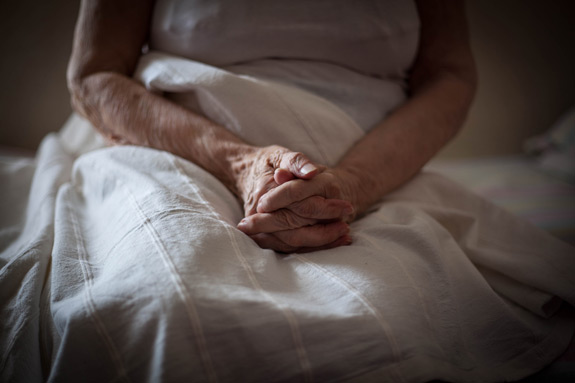The signs may be so subtle you don’t even notice them.
When you are caregiving for a senior loved one – especially one who is battling a long-term illness – you may be so focused on their day-to-day needs that you miss the symptoms of depression.

However, depression is not “just a part of growing old.” Caregivers should explore ways to get treatment for their loved ones.
“Oftentimes there’s a belief that it’s a normal part of aging for people to feel bad, or to go through loss, or to have lots of death and grief, and to just not recover from their depression, when in truth it’s very recoverable and it’s something we should be targeting,” Dr. Julie Rickard, psychologist and founder of the Suicide Prevention Coalition of North Central Washington State told NPR. “If we treated them, they wouldn’t feel like they were swimming in the middle of the ocean with no life preserver.”
Signs and Symptoms of Depression
The first step in treating seniors with depression is recognizing its signs and symptoms.
The National Institute of Mental Health (NIMH) shares some of the most common signs of depression in the elderly:
- I’ve got the blues– Personality changes can signify the presence of depression. Pay close attention to your loved one’s moods over time. Everyone has a down day, but if your carefree, always-laughing mom is now withdrawn, crying or anxious most of the time, you may need to ask about depression at her next doctor’s appointment.
- I’m skipping [insert favorite hobby here]– If your elderly loved one stops indulging in their favorite hobby (whether that’s exercising, knitting, watching a favorite sports team, socializing or something else), you’ll want to explore the reason they stopped. Depression can cause people to experience a “loss of interest or pleasure in hobbies and activities,” writes the NIMH.
- I’m a burden– Depression can cause feelings of “hopelessness, pessimism, guilt, worthlessness and helplessness.” These can manifest in several different ways and phrases. If your loved one is calling themselves a “burden” or telling you that they feel guilty about how much time you have to spend with them, it could be a sign of depression.
- UGH!!– People suffering from depression can feel restless and irritable. So, if your loved one is snapping at you or being overly critical, it could be a sign of depression.
- I’m just tired– Fatigue and lack of energy can be a symptom of depression. However, it can also be a sign of other chronic illnesses. Accordingly, you may need to see your loved one’s healthcare provider to determine if he or she is suffering from depression.
- I don’t feel well– Like fatigue, physical pains can be a sign of other illnesses. However, depression symptoms can sometimes be physical – like “aches or pains, headaches, cramps, or digestive problems without a clear physical cause and/or that do not ease even with treatment,” writes the NIMH.
- “Senior” moments– Sometimes your elderly parent or loved one will forget a word, have trouble concentrating, or struggle to make decisions. Some will write this up to a “senior moment,” but if these happen frequently, you may want to talk to his or her healthcare provider to ensure it isn’t something more serious.
- Changes in daily habits– Depression can interfere with natural sleep cycles (e.g., sleeping too much or too little) and appetite (eating too much or too little).
- Thoughts of death or suicide, suicide attempts– According to the S. Department of Health and Human Services, “about 60 percent of people who commit suicide have had a mood disorder (e.g., major depression, bipolar disorder, dysthymia).” If you suspect your elderly loved one is having suicidal thoughts, please call the National Suicide Prevention Lifeline at 1-800-273-8255.
If your loved one is demonstrating some or any of these signs over a period of weeks, it may be time to talk with their healthcare provider about depression.
How to Start the Conversation about Depression

“Let’s start by saying what people should not do. Depression sucks and many people hate both feeling depressed and the fact that they ‘let’ themselves get depressed. So many people ‘turn against themselves’ and become very critical and try to control their feelings. This is a recipe for the depressive shutdown to get much worse,” writes Gregg Henriques Ph.D., psychologist and director of the Combined Clinical and School Psychology Doctoral Program at James Madison University, in an article for Psychology Today. “The second thing is to be aware that folks cannot just snap out of a depression.”
Accordingly, before you start the conversation, you should go into it with two guiding principles: 1) be patient and 2) be prepared to listen more than talk. Maybe it will only take a few questions to get your loved one to open up. Maybe it will take more than one conversation to get them to share how they are feeling. Maybe one word will open the flood gates and your loved one will be relieved someone finally asked. Regardless of the situation, having patience and compassion will help.
Starting the conversation can be the hardest part. Seize the Awkward website offers some “I suspect you are depressed” conversation starters, including:
- “I’ve noticed you’ve been down lately. What’s going on?”
- “Seems like you haven’t been yourself lately. What’s up?”
- “I know you’re going through some stuff; I’m here for you.”
The site offers this encouragement: “It’s hard to know what to say to someone who is struggling with depression, anxiety, or other mental health issues. No need to be an expert. Just be a friend.”
Further, the site suggests you should ask open-ended questions (avoiding yes/no questions), you shouldn’t demand answers, and, finally, encourage them to talk to an expert.
Tips for Talking with the Doctor About Depression
The next step – if your elderly parent or loved one has agreed that he or she may be depressed – is talking to a healthcare professional.
A good place to start is to schedule an appointment with your loved one and their primary care physician. If it is a doctor or nurse practitioner that they have been going to for years, your loved one may feel embarrassed to share their feelings. However, the website Very Well Mind indicates that this should not be a concern:
“While you may feel embarrassed to ask for help, it is not necessary to feel this way. Depression is a very common condition and your doctor is already quite familiar with it. It will not seem strange or shameful in any way to her that you are feeling depressed.”

After the assessment, the doctor will talk to you about treatment options, which could include medication, talk therapy, referrals to specialists or others.
If your loved one is taking medications for other medical conditions, your healthcare provider will conduct a comprehensive patient evaluation to determine what medication may work best. The clinician may determine that your loved one is a good candidate for the GeneSight test, if he or she has previously tried a depression medication and failed.
Depression in the elderly is not a normal part of aging and should be treated. By caring, taking note of symptoms and talking with your loved one, you can help get them on the path to recovery.
For more information about depression treatment for older loved ones, please visit our blog post at https://genesight.com/blog/patient/not-a-normal-part-of-aging-geriatric-depression/.
Our articles are for informational purposes only and are reviewed by our Medical Information team, which includes PharmDs, MDs, and PhDs. Do not make any changes to your current medications or dosing without consulting your healthcare provider.
The GeneSight test must be ordered by and used only in consultation with a healthcare provider who can prescribe medications. As with all genetic tests, the GeneSight test results have limitations and do not constitute medical advice. The test results are designed to be just one part of a larger, complete patient assessment, which would include proper diagnosis and consideration of your medical history, other medications you may be taking, your family history, and other factors.
If you are a healthcare provider and interested in learning more about the GeneSight test, please contact us at 855.891.9415. If you are a patient, please talk with your doctor to see if the GeneSight test may be helpful.





